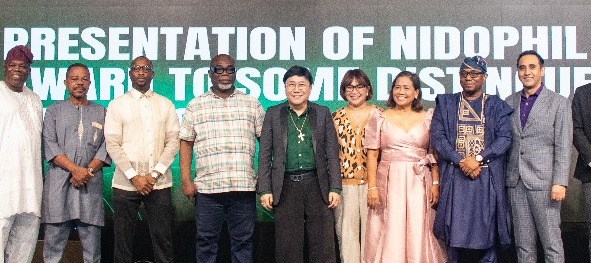
FOR the 8th session, the task at hand is emergence of a Senate President that will be an improvement over what the 7th session achieved. Nothing short of this will do the government of the All Progressives Congress (APC) and the nation some good.
The Roll Call
EVAN Enwerem, former governor of Imo State, was elected President of the Senate, in 1999, having defeated Dr. Chuba Okadigbo.
Enwerem occupied the office for only six months before trouble came calling. His tenure was turbulent, because he was an imposition by then president Olusegun Obasanjo. Members only took some time to plot and impeach him over some side issues of academic qualification and the mundane issue of his appropriate name Evan or Evans?
The Banana Peel was carefully laid for him and he slipped. He was impeached in 1999 and his colleagues wasted no time to return Okadigbo, who was their number one choice.
Chuba Okadigbo
HIS ascendancy to the office of the Senate President was as dramatic as his exit. Okadigbo, colourful, flamboyant and witty, was as well haughty. It was hubris that made Obasanjo detest him in the first place, but the political scientist was not smart enough to put in place safety nets to protect him from future plots. A political juggernaut, he was like first among equals and did not feel the need to surrender to an equally haughty chief executive.
An internal investigation was instigated on contracts awarded by the Senate leadership, and that was how by a vote of 81 to 14, Okadigbo’s tenure was terminated in August 2000. Some of the charges against Okadigbo include; that he purportedly bought eight official cars for $290,000 bringing his total of official vehicles to 32. Spent $225,000 on garden furniture for his luxury government house. Spent $340,000 furnishing the home to his taste, $120,000 over the authorised budget. The unauthorised purchased a massive generating and inflated the price to $135,000. Accepted a secret payment of $208,000 from public funds.
Anyim Pius Anyim (2000 –– 2003)
AFTER the drama that characterised his predecessor’s tenure, Senator Anyim Pius Anyim emergence as senate president confounded not a few political watchers.
Anyim, who won election into the senate under the platform of the Peoples Democratic Party (PDP), in 1999, like his two predecessor, was a no match in profile for either Enwerem or Okadigbo.
Beyond 1998, when he contested and won senate election under United Nigeria Congress Party (UNCP), which was stillborn due to General Sani Abacha death, little was known of him, politically.
But he brought stability to the senate, which was becoming notorious for power game. He survived a number of plots to impeach him. One of these plots may have influenced the decision to suspend indefinitely, in November 2002, Senator Arthur Nzeribe, due to an allegation of a N22 million fraud. Nzeribe was said to be planning an impeachment motion against Anyim.
In turn, Anyim purportedly planned to impeach the then President, General Olusegun Obasanjo. Though, he was to remark later that the president had only misunderstood and he had nothing against Obasanjo. But the disquiet between him and Obasanjo may have accounted for Anyim not seeking re-election after the expiration of his first tenure.
The handwriting, according to political watchers, was clearly on the wall. Anyim was believed to have pitched tent with opposition All Nigeria Peoples Party (ANPP) to frustrate the PDP in his senatorial district.
As a Senate President, Anyim had a frosty relationship with then sitting Governor of Ebonyi State, Dr. Samuel Egwu. Some time, after leaving office, his private house in Abuja was partially pulled down for violating the Abuja master plan.
Adolphus Wabara (2003 –– 2005)
QUITE unlike Enwerem and Okadigbo, Chief Adolphus Wabara also fell from grace to grass, biting the dust over gale of allegation of corruption. The Economic and Financial Crimes Commission (EFCC) accused Wabara and the senate leadership under his senate presidency of collecting N55 million from the then Minister of Education, Dr. Fabian Osuji.
A year before his eventual debacle, the outgoing senate president, David Mark, had led other senators, called Group of 86 senators, who moved against Wabara for alleged misappropriation of Senate funds. Before the scandal, Wabara was accused by his colleagues of financial misconduct and gross-misconduct, all accusation he denied; alleging that is was the Igbo Senators that are behind it because they wanted his position.
Though, the allege third term agenda of former President Olusegun Obasanjo came up much later after Wabara debacle, the former senate president later fingered the agenda to be behind his travails in the senate. Wabara also alleged that, because he did not support the third term agenda, Obasanjo denied him the national award he should have been given in 2003.
According to Wabara, “Whatever he contrived came up in 2005. But because he had approached me in 2003 – a month or two after we came in, on this third term thing, and I didn’t know where he was coming from, I said ‘no, Your Excellency, this cannot work.’ In 2003, he told me clearly that the way I was working, I would continue as Senate President in 2007. I said ‘excuse me sir, how can I continue as Senate President when by 2007, the equation would change; the zoning would change and it would be a northerner who would become the Senate President, as we have it now’. That was the end of my discussion with him on that day and that was what cost me the GCON. It was not even the case of the N55m bribe-for-budget scandal that came up in 2005.”
Ken Nnamani (2005 –– 2007)
UPON resignation of Wabara because of corruption allegations, Nnamani became the president of the senate on April 5, 2005. Elected to the senate to represent Enugu East, in 2003, Nnamani was appointed Chairman of the Committee on Federal Character & Governmental Affairs and member of committees on Privatisation, Federal Capital Territory and Appropriation & Finance.
In his twilight as senate president, Nnamani was accused of plotting to emerge as the country’s president under an interim government arrangement.
A section of civil society organisations joined in the call for this in view of constitutional dilemma that may make the postponement of 2007 elections unavoidable. In an interview, the then Independent National electoral Commission (INEC) chairman, Prof Maurice Iwu, alluded to this plot, when he alleged that Nnamani had contacted him flying that particular kite.
Best known for his purported stand against alleged third term agenda, Nnamani is largely perceive to be mature, fair and principled. But as a commentator put it, “If Ken Nnamani is your best senate president, and his best achievement is that he helped put down the third term bid. In four or so years that is his achievement. Kudos to him. It is a country of low expectations.”
David Mark
BY far the most stabilising influence on the leadership of the senate, the electoral defeat of the PDP by the All Progressives Congress (APC) may have dealt a blow on the third term ambition David Mark might have been harbouring.
Although Mark won his re-election in a resounding form, polling over 90,000 votes to defeat his opponent who scored over 50,000 votes, his party lost the majority strength to produce the next senate president.
Consequently, Mark will return to the hallowed chamber from June as a floor member. The retired army colonel is one of the only two survivors of the 109 senators who were elected into the Senate in 1999. His only contemporary from the fourth senate, Senator Bello Gwarzo, who is the incumbent chief whip, lost woefully at the Kano South senatorial election on March 28, scoring 850 votes.
Incidentally, Mark’s cross bear some similarities to that of his deputy, Senator Ike Ekweremadu, representing Enugu West. Ekweremadu will also lose his eight years’ status as deputy Senate President in June. With his counterpart, James Manager, from Delta South, they are the only survivors of the group of senators who were elected into the fifth National Assembly in 2003 that will also be part of the eight session.






